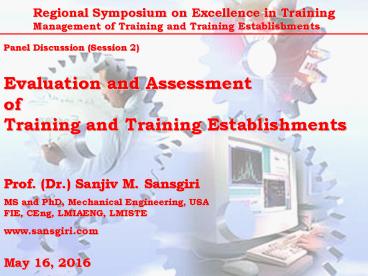Evaluation And Assessment of Training - PowerPoint PPT Presentation
1 / 12
Title:
Evaluation And Assessment of Training
Description:
Regional Symposium on Excellence in Training Management of Training and Training Establishments Panel Discussion (Session 2) Evaluation and Assessment – PowerPoint PPT presentation
Number of Views:285
Avg rating:3.0/5.0
Title: Evaluation And Assessment of Training
1
Regional Symposium on Excellence in
Training Management of Training and Training
Establishments
Panel Discussion (Session 2) Evaluation and
AssessmentofTraining and Training
Establishments Prof. (Dr.) Sanjiv M.
Sansgiri MS and PhD, Mechanical Engineering,
USAFIE, CEng, LMIAENG, LMISTE www.sansgiri.com M
ay 16, 2016
2
Terminology
- Three Key Processes
- Evaluation
- Leveraging specific customized criteria for
judging and qualifying performance, output or
pertinent learning outcome - Assessment
- Gather information and/or feedback to help
stakeholders (trainee included) interpret data
and arrive at learning efficiency/effectiveness - Assessment Goal is to make improvements not
simply judge - Measuring
- Grading quality of performance (Grade
percentage, letter, number, etc) - Focus is on Trainee, Trainer, Content,
Infrastructure, System etc.
3
Evaluation Steps
Define TestObjective/Purpose
Set STANDARD
Measure PerformanceorAdminister Test
Compare Performanceto STANDARD
1. Do Evaluation2. Share and Publish
Firm up1. Lessons Learned2. Best Practices
4
Assessment Strategies
- Assessment of Training
- Purpose Report through summative evaluation
- Use training evidence to judge trainee
performance, in relation to - Goals
- Standards
- Learning Outcomes
Assessment for Training Purpose Guide training
through formative feedback Draw inferences about
training and progress from ongoing data and
impact training
Assessment as Training Purpose Develop and
support trainee metacognition through
reflection Reflection by trainees on training and
progress, to closely monitor their training
5
Evaluation and Assessment Methods
- Surveys/Interviews Planned sequence of questions
(exchange of ideas) - Homework/Case studies Formal tools (usually
Formative) - One-on-one/Observe/Discuss/Home-rooms Informal
tools - Do-it-yourself Tasks Focus on the Journey
(usually Formative) - Presentation/Demos/Fieldwork Implementation and
Maturity - Project/Product Assignments have impressions
(usually Summative) - Portfolios Formal/Informal collection of
outcomes (shows growth pattern)
6
Evaluation and Assessment Development
- What knowledge and/or skills to highlight?
- Outcome objectives
- Meaningful feedback
- Is outcome for formative or summative purposes?
- What are instructional objectives and delivery
methods? - Class size and the optimum route to effectively
assess all trainees - Repeatability and reusability
7
Example Leadership Development by Level
Top Management
Middle Management
Bottom Management
8
Practices and Success Factors
9
Success Factors Translated across Levels
10
Case Charting Potential
An example of Success Factors mapped for a
manager in Middle Management level having
potential for Senior Management level
Middle Senior Top
People Development People Development People Development
Stimulates and supports a learning culture Reviews organizational capability and fosters talent Builds future capability
Certainly Now good sense of Some grasp of
Functional Excellence Functional Excellence Functional Excellence
Learns and uses knowledge for operational excellence Learns and uses knowledge for business innovation Learns and uses knowledge for creating strategy
Yes Discusses understands Not really creating yet
11
Focus for Maximizing Efficiency
- Standard work
- Goal/target orientation
- Performance measurement system
- Innovation, Structured and Non-improvisation
- Brand and Branding (Organization/Department
Reputation) - Accountability and connection with core
department - Best practices and lessons learned ? Lead to next
generation standard work - Stakeholder focus
- Identify organization Nodes and Hubs
- Checks and "What if" scenarios
- Peer reviews
- Internal and external Audits
- Beyond stakeholder satisfaction ? Stakeholder
delight
12
(No Transcript)































